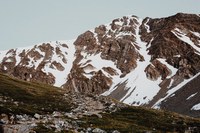Written by Bella Biondini
As Colorado continues to adapt and loosen restrictions surrounding COVID-19, the Colorado Mountain Club will also be loosening some of its protocol in line with state orders and industry guidelines.
More than 71% of Colorado residents participate in outdoor recreation each year, according to the Outdoor Industry Association. As restrictions begin to lift, residents are starting to plan hikes, camping trips and outdoor travel.
Coronavirus cases within the state of Colorado have slowly increased over the last 14 days, according to state health experts. Residents turned to public lands, seeking normalcy through outdoor recreation.
The barrage of new restrictions and regulations can be difficult to navigate as Colorado slowly reopens in an effort to halt the spread of COVID-19. The state encourages residents to maintain social distancing while outdoors and during recreation, as well as while indoors.
Starting July 1, the CMC will begin a slow opening process and will allow trips to resume, Trip Leader Support Coordinator Maddie Miller said. The CMC plans to respect existing rules and closures and adjust accordingly.
“The CMC has handled the pandemic well,” Miller said. “We have come out ahead of the game. I am proud to be part of an organization that has been able to react and then implement changes smoothly.”
In July and August, the CMC will begin allowing overnight trips for its new Backpacking Section. Members will also be able to go climbing and do harder C and D hikes.
To promote the health and safety of its members, the CMC added masks to its list of the 10 Essentials, which includes critical items members should take on every outdoor excursion.
Masks must be worn at trailheads and while passing others, but members will be able to take breaks from their masks while hiking. Maintaining a 6-foot distance between people is still encouraged, Miller said.
Trip sizes will still be strictly limited to 10 people, including the trip leader. Groups must attempt to avoid overly crowded and high-use areas. All trip leaders and participants must carry either 70% alcohol-based hand sanitizer or biodegradable hand soap with them at all times.
“We all love to recreate and all Coloradans want to get outside and get fresh air while they can,” Miller said. “We will make sure we are washing hands and not using public restrooms and doing what we do best by peeing in the woods.”
Other Colorado areas are still under strict restrictions to promote public safety in the outdoors.
Rocky Mountain National Park is the third most visited national park in the United States. Timed entry permits and camping reservations are now required for private vehicles to enter Rocky Mountain National Park between 6 a.m. and 5 p.m. At this stage, the Wild Basin area and Wild Basin Road will remain closed.
“This system will more safely manage the pace and flow of visitor use, reduce crowding, and provide an improved visitor experience commensurate with the park’s safe operational capacity,” according to a park news release.
Reservations should be made online in advance where visitors can select the preferred day and time of their visit. They can be made a month ahead of time, although a limited number of reservations are available for last-minute visits.
The permit system will apply to all areas of RMNP and minimize contact between park entrance station staff and visitors and limit congestion in parking lots.
The initial phase of reopening allows for 60% of the park’s parking capacity or around 4,800 vehicles per day, according to park officials. The booking system allows a two-hour window for visitors to enter.
Aspen’s Maroon Bells scenic area, one of the most photographed places in the state according to Colorado Tourism, will also require reservations for entry due to social distancing requirements and the high demand for entry. Reservations will be needed for both private vehicles and the visitor shuttle.
Beginning June 28, visitors will be required to use the shuttle service between the hours of 8 a.m.-5 p.m. Two-day overnight parking will be available for visitors who want to complete the 28-mile Four Pass Loop through the area.
Long distance trails are being heavily impacted from COVID-19, as they normally attract visitors from around the country and internationally.
Continental Divide Coalition Director Teresa Martinez asks that people rethink whether this is the year for their thru-hike of the Continental Divide National Scenic Trail, spanning 3,100 miles between Canada and Mexico.
“While the trail is a great place to physically distance and stay healthy and especially emotionally as well as physically, the trail itself is dependent on small rural communities with limited services and medical capacities,” Martinez said.
The organization shut down the operation of their shuttle in an effort to keep hikers and drivers safe.
People expect solitude on the CDT, but in some of the higher use areas this may not be the case, Martinez added. Hikers must be prepared for regulations that can change overnight and be mentally prepared for unstable local conditions.
Martinez advises residents to hike locally and enjoy trails in their own communities.
“Be strong and come back next year,” she said. “We are seeing how important public lands have been to people healing, staying healthy: physically, emotionally and mentally. The pandemic has shown we need public lands now more than ever before.”
*****
Read More About How the CMC will Promote Public Health During Phase 2
 CMC Press
CMC Press

Add a comment
Log in to add comments.